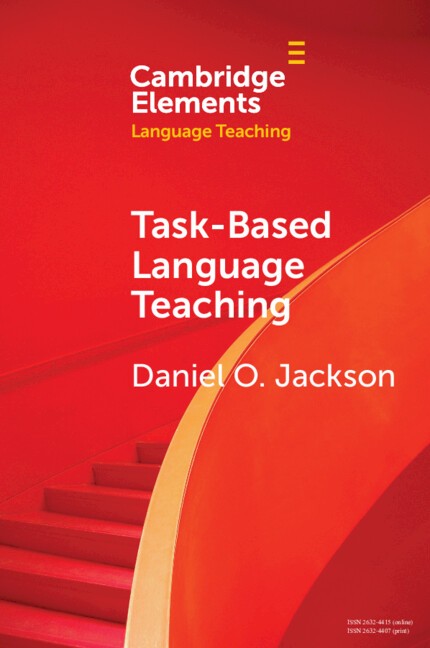Home >
Cambridge Elements in Language Teaching >
Task-Based Language Teaching (Paperback)
Cambridge Elements in Language Teaching
Task-Based Language Teaching (Paperback)
ISBN: 9781009068413
Series: Cambridge Elements in Language Teaching
Task-Based Language Teaching (Paperback)
Cambridge Elements in Language Teaching Task-Based Language Teaching (Paperback) Media > Books > Non-Fiction > Education Books Now available| Order Below |
ISBN
9781009068413 (10-digit ISBN: 1009068415)
- Description
- Series Description
This Element is a guide to task-based language teaching (TBLT), for language instructors, teacher educators, and other interested parties. The work first provides clear definitions and principles related to communication task design. It then explains how tasks can inform all stages of curriculum development. Diverse, localized cases demonstrate the scope of task-based approaches. Recent research illustrates the impact of task design (complexity, mode) and task implementation (preparation, interaction, repetition) on various second language outcomes. The Element also describes particular challenges and opportunities for teachers using tasks. The epilogue considers the potential of TBLT to transform classrooms, institutions, and society.
Language teaching as a field of study straddles the disciplines of education and applied linguistics (and at times other disciplines such as applied psychology and applied sociology). As societies have become increasingly mobile, language teaching practices have changed to keep pace with changing learners’ needs. Globalisation has led to dramatic changes in language pedagogies, both in terms of the rise of global lingua franca such as English, Spanish, Chinese, and Arabic, as well as issues surrounding language teaching in immigrant communities.
As language teaching has developed as a distinct academic field, some scholars have observed a widening gap between researchers and practitioners, accompanied by limited exposure to research by teachers, and a disconnect between professional and academic publications. This elements series aims to close this gap by allying research with language teaching practices, in its exploration of research-informed pedagogy, and pedagogy-informed research. The series builds upon a rich history of pedagogical research in its exploration of new insights within the field of language teaching.
As language teaching has developed as a distinct academic field, some scholars have observed a widening gap between researchers and practitioners, accompanied by limited exposure to research by teachers, and a disconnect between professional and academic publications. This elements series aims to close this gap by allying research with language teaching practices, in its exploration of research-informed pedagogy, and pedagogy-informed research. The series builds upon a rich history of pedagogical research in its exploration of new insights within the field of language teaching.
This Element is a guide to task-based language teaching (TBLT), for language instructors, teacher educators, and other interested parties. The work first provides clear definitions and principles related to communication task design. It then explains how tasks can inform all stages of curriculum development. Diverse, localized cases demonstrate the scope of task-based approaches. Recent research illustrates the impact of task design (complexity, mode) and task implementation (preparation, interaction, repetition) on various second language outcomes. The Element also describes particular challenges and opportunities for teachers using tasks. The epilogue considers the potential of TBLT to transform classrooms, institutions, and society.
As language teaching has developed as a distinct academic field, some scholars have observed a widening gap between researchers and practitioners, accompanied by limited exposure to research by teachers, and a disconnect between professional and academic publications. This elements series aims to close this gap by allying research with language teaching practices, in its exploration of research-informed pedagogy, and pedagogy-informed research. The series builds upon a rich history of pedagogical research in its exploration of new insights within the field of language teaching.
Series Description
Language teaching as a field of study straddles the disciplines of education and applied linguistics (and at times other disciplines such as applied psychology and applied sociology). As societies have become increasingly mobile, language teaching practices have changed to keep pace with changing learners’ needs. Globalisation has led to dramatic changes in language pedagogies, both in terms of the rise of global lingua franca such as English, Spanish, Chinese, and Arabic, as well as issues surrounding language teaching in immigrant communities.As language teaching has developed as a distinct academic field, some scholars have observed a widening gap between researchers and practitioners, accompanied by limited exposure to research by teachers, and a disconnect between professional and academic publications. This elements series aims to close this gap by allying research with language teaching practices, in its exploration of research-informed pedagogy, and pedagogy-informed research. The series builds upon a rich history of pedagogical research in its exploration of new insights within the field of language teaching.
EASY ORDER FORM
PRICES LISTED INCLUDE CONSUMPTION TAX
Price Before Tax:
¥3,630 ¥2,904 ∼ 20% OFF!


